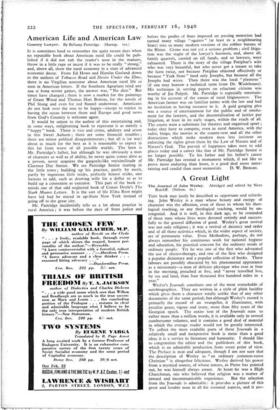American Life and American Law
Country Lawyer. By Bellamy Partridge. (Harrap. los.)
IT is sometimes hard to remember the quite recent days when no reputable book about American rural life could be pub- lished if it did not rub the reader's nose in the manure, throw in a little rape or incest if it was to be really " strong," and, above all, show the rural economy in a state of advanced economic decay. From Ed Howe and Hamlin Garland down to the authors of Tobacco Road and Desire Under the Elms, there is no Virgilian nonsense about American rural life as seen in American letters. If the Southern Agrarians tried any sua si bona norint games, the answer was, " No dice." But times have changed ; there is now a market for the paintings of Grant Wood and Thomas Hart Benton, for the novels of Phil Stong and even for red flannel underwear. Americans do not look over the seas to be happy—except to rejoice in having the ocean between them and Europe and good news from God's Country is welcome again.
It would be unjust to the author of this entertaining and, in some ways, enlightening book to represent it as merely a " happy " book. There is vice and crime, adultery and arson in this Sweet Auburn ; there are some financial troubles ; there are minor political disappointments ; but all is (or was) about as much for the best as it is reasonable to expect in this far from worst of all possible worlds. The hero is Mr. Partridge's father, but although he was obviously a man of character as well as of ability, he never quite comes alive as a person, never acquires the gargoyle-like verisimilitude of Clarence Day Senior. We see Partridge Senior starting in the little town ; building up his practice, partly by merit, partly by ingenious little tricks, perfectly honest tricks, one hastens to add, such as drawing wills for a dollar so as to build up a connexion as executor. This part of the book re- minds one of that odd neglected book of Conan Doyle's The Stark Munro Letters. It is the sort of life Elihu Root might have led had he stayed in up-State New York instead of going off to the great city.
Mr. Partridge incidentally tells us a lot about practice in rural America ; it was before the days of State police and
before the profits of fines imposed on passing motorists had turned many village " squires " (at least in a neighbouring State) into so many modern versions of the robber barons of the Rhine. Crime was not yet a serious problem ; civil litiga- tion was the staple of the lawyer's business, and, above all, family quarrels, carried on till funds, and so lawyers, were exhausted. There is the story of the village Potiphar's wife who was very beautiful, but who never got a tenant to take the farm twice, not because Potiphar objected effectively or because " York State " bred only Josephs, but because all the Josephs had wives. Then there was the local ." plasterer " (if one may borrow a technical term from Dr. Wodehouse). His technique in serving papers on reluctant citizens was worthy of Joe Pulpitt. Mr. Partridge is especially entertain- ing in his account of the causes of rural litigiousness. The American farmer was on familiar terms with the law and had no hesitation in having recourse to it. A guid ganging plea was a source of entertainment for the public and of emolu- ment for the lawyers, and the decentralisation of justice put litigation, at least in its early stages, within the reach of all. The courts were a substitute for theatres and organised sport ; today they have to compete, even in rural America, with the radio, bingo, the movies at the county-seat and all the other distractions which make modern men less insistent on enforcing the rights given them by the Law of Nature and of Nature's God. The pursuit of happiness takes men to odd places today and a career like that of Mr. Partridge Senior is no longer possible. To his father and his father's career Mr. Partridge has erected a monument which, if not like to prove more enduring than brass, is a good deal more enter- taining and candid than most memorials. D. W. BROGAN.






































 Previous page
Previous page